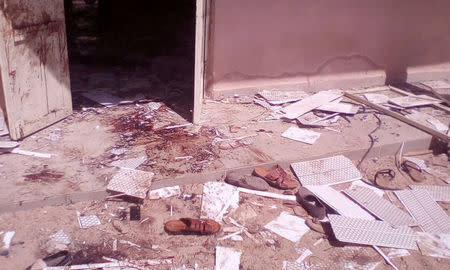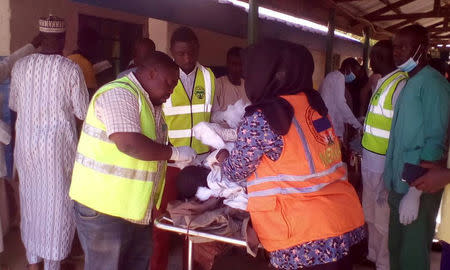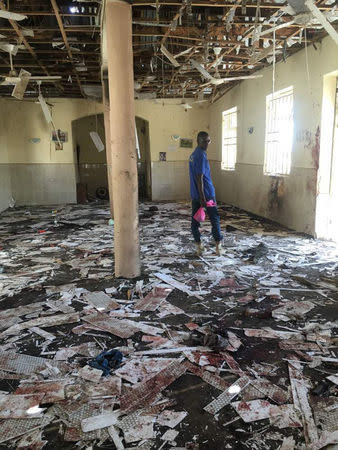Suicide bomber kills 50 in Nigeria in mosque attack
By Percy Dabang and Ardo Hazzad
YOLA, Nigeria (Reuters) - A suicide bomber killed at least 50 people in northeastern Nigeria on Tuesday in an attack on a mosque which bore the hallmarks of a faction of the Islamist militant group Boko Haram.
The bombing in Mubi in Adamawa state was one of the deadliest in Nigeria's northeast since President Muhammadu Buhari came to power in 2015 pledging to end Boko Haram's eight-year insurgency and attacks by the group on civilian and military targets.
It brought to at least 278 the number of people killed in 2017, according to calculations by Reuters. There was no claim of responsibility.
"Some of the dead were in pieces beyond recognition," said Bayi Muhammad, a worshipper who escaped the blast because he was late for early morning prayers.
Abubakar Othman, a police spokesman in Adamawa state, said the death toll was at least 50, but added that the tally could rise.
Eight people were critically injured and more than 30 others hurt but in stable condition, said Idris Garga, the northeast regional coordinator for Nigeria's national emergency agency.
Boko Haram held territory in Adamawa state in 2014. Troops pushed them out in early 2015, and the town of Mubi had itself been relatively peaceful until Tuesday's bombing.
In a statement on Tuesday, Nigeria's president said the attack was "very cruel" and gave assurances his government would do "everything required" to secure the state from Boko Haram.
The militant group often mounts suicide attacks in public places such as mosques and markets. Last December, two schoolgirl suicide bombers killed 56 people and wounded dozens more at a market in Adamawa.
The mosque blast bears the hallmarks of a faction led by Abubakar Shekau, which forces women and girls to carry out suicide bombings. The attacks often leave only the bomber dead.
Boko Haram has waged an insurgency in northeastern Nigeria since 2009 in its attempt to create an Islamic state in the region. It has killed more than 20,000 and forced around 2 million people to flee their homes.
The group split in 2016 and the faction under Shekau is based in the Sambisa forest on the border with Cameroon and Chad and mainly targets civilians with suicide bombers.
The other faction is based in the Lake Chad region and led by Abu Musab al-Barnawi. It mainly attacks military forces after quietly building up its strength over the past year.
Most attacks focus on Borno state, the birthplace of the insurgency. The group held land around the size of Belgium in Borno, Adamawa and Yobe states until early 2015 but was forced out by Nigeria's army and troops from neighbouring countries.
(Reporting by Percy Dabang in Yola and Ardo Hazzad in Bauchi; Writing by Alexis Akwagyiram and Paul Carsten; Editing by Richard Balmforth)

 Yahoo News
Yahoo News 








